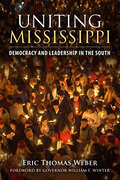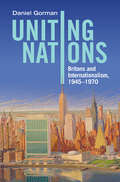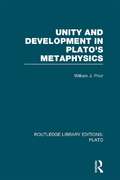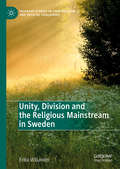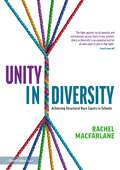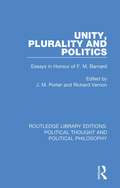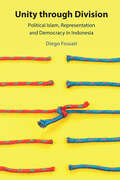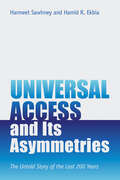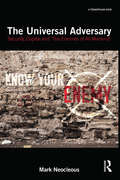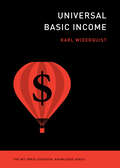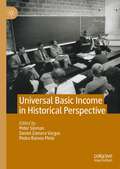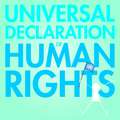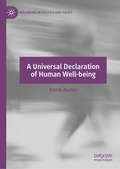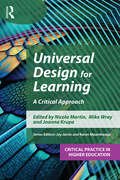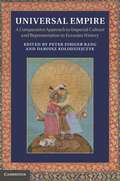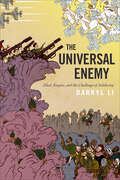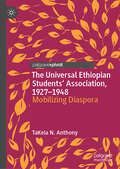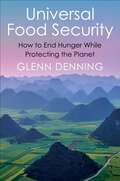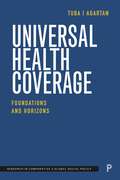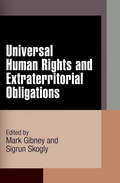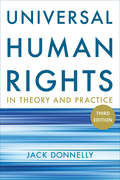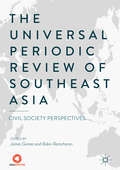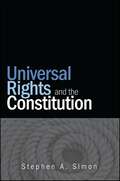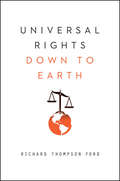- Table View
- List View
Uniting Mississippi: Democracy and Leadership in the South
by Eric Thomas WeberUniting Mississippi applies a new, philosophically informed theory of democratic leadership to Mississippi's challenges. Governor William F. Winter has written a foreword for the book, supporting its proposals.The book begins with an examination of Mississippi's apparent Catch-22, namely the difficulty of addressing problems of poverty without fixing issues in education first, and vice versa. These difficulties can be overcome if we look at their common roots, argues Eric Thomas Weber, and if we practice virtuous democratic leadership. Since the approach to addressing poverty has for so long been unsuccessful, Weber reframes the problem. The challenges of educational failure reveal the extent to which there is a caste system of schooling. Certain groups of people are trapped in schools that are underfunded and failing. The ideals of democracy reject hierarchies of citizenship, and thus, the author contends, these ideals are truly tested in Mississippi. Weber offers theories of effective leadership in general and of democratic leadership in particular to show how Mississippi's challenges could be addressed with the guidance of common values.The book draws on insights from classical and contemporary philosophical outlooks on leadership, which highlight four key social virtues: wisdom, courage, moderation, and justice. Within this framework, the author approaches Mississippi's problems of poverty and educational frustration in a novel way that is applicable in and beyond the rural South. Weber brings to bear each of the virtues of democratic leadership on particular problems, with some overarching lessons and values to advance. The author's editorial essays are included in the appendix as examples of engaging in public inquiry for the sake of democratic leadership.
Uniting Nations: Britons and Internationalism, 1945–1970
by Daniel GormanUniting Nations is a comparative study of Britons who worked in the United Nations and international non-governmental and civil society organizations from 1945 to 1970 and their role in forging the postwar international system. Daniel Gorman interweaves the personal histories of scores of individuals who worked in UN organizations, the world government movement, Quaker international volunteer societies, and colonial freedom societies to demonstrate how international public policy often emerged 'from the ground up.' He reveals the importance of interwar, Second World War, colonial, and voluntary experiences in inspiring international careers, how international and national identities intermingled in the minds of international civil servants and civil society activists, and the ways in which international policy is personal. It is in the personal relationships forged by international civil servants and activists, positive and negative, biased and altruistic, short-sighted or visionary, that the “international” is to be found in the postwar international order.
Unity and Development in Plato's Metaphysics (Routledge Library Editions: Plato)
by William PriorStudies of Plato’s metaphysics have tended to emphasise either the radical change between the early Theory of Forms and the late doctrines of the Timaeus and the Sophist, or to insist on a unity of approach that is unchanged throughout Plato’s career. The author lays out an alternative approach. Focussing on two metaphysical doctrines of central importance to Plato’s thought – the Theory of Forms and the doctrine of Being and Becoming – he suggests a continuous progress can be traced through Plato’s works. He presents his argument through an examination of the metaphysical sections of six of the dialogues: the Euthyphro, Phaedo, Republic, Parmenides, Timaeus, and Sophist.
Unity, Division and the Religious Mainstream in Sweden (Palgrave Studies in Lived Religion and Societal Challenges)
by Erika WillanderThis book presents new conceptual and methodological approaches to studying religiosity in Europe. From her unique background of working with the Church of Sweden statistics and official statistics on the increasing religious diversity in Sweden, Willander illustrates how previous and current methods of analysing religiosity overlook substantial aspects in patterns of affiliation, belief and practice. Unity, Division and the Religious Mainstream in Sweden draws on the sociological imagination in the sociology of religion to offer a new and empirically-driven analytical framework that shifts the focus to religious change in general, and will contribute greatly to ongoing discussions about majority forms of religiosity and their social relevance in contemporary times. It will be of use to students and scholars with a focus on the sociology of religion, as well as sociology, political science, epistemology and media studies.
Unity in Diversity: Achieving Structural Race Equity in Schools
by Rachel MacfarlaneA third of all children in our schools are from racially minoritised backgrounds. Yet the data on attainment, exclusion, progression and representation indicates that our education system is structurally racist. Unity in Diversity explores the unconscious biases at play in our schools and demonstrates how educators can address this by improving representation in the curriculum, staffroom and on the governing/trust board. Drawing on case studies from leaders, this book demonstrates what schools are already doing to create an impactful anti-racist ethos and how these strategies may be applied in practice. Written by an experienced headteacher who has supported a diverse range of schools in improving their race equity, each chapter addresses a different aspect of race inequality and provides practical strategies for overcoming it. This book empowers readers: To acknowledge that systemic race inequality exists in schools and that this necessitates an anti-racist approach To become comfortable talking about race and to create safe spaces for staff and students to engage in discussions about race To address unconscious biases and white fragility and to examine the inequality and underrepresentation of ethnic groups To audit all aspects of educational provision to determine what needs to change and to action and implement this change with lasting impact. Schools and teachers can play a major role in eliminating systemic racism in society. This book is an essential read for any teacher, leader, governor or trustee who is restless to address race inequity in our education system, creating a more equal and represented school community.
Unity in Faith?: Edinoverie, Russian Orthodoxy, and Old Belief, 1800–1918
by J. M. WhiteThe little known history of an attempt to end a religious schism in imperial Russia, and the questions it raised about church and state.Established in 1800, edinoverie (translated as “unity in faith”) was intended to draw back those who had broken with the Russian Orthodox Church over ritual reforms in the seventeenth century. Called Old Believers, they had been persecuted as heretics. In time, the Russian state began tolerating Old Believers in order to lure them out of hiding and make use of their financial resources as a means of controlling and developing Russia’s vast and heterogeneous empire.However, the Russian Empire was also an Orthodox state, and conversion from Orthodoxy constituted a criminal act. So, which was better for ensuring the stability of the Russian Empire: managing heterogeneity through religious toleration, or enforcing homogeneity through missionary campaigns? Edinoverie remained contested and controversial throughout the nineteenth and early twentieth centuries, as it was distrusted by both the Orthodox Church and the Old Believers themselves. The state reinforced this ambivalence, using edinoverie as a means by which to monitor Old Believer communities and employing it as a carrot to the stick of prison, exile, and the deprivation of rights.In Unity in Faith?, James White’s study of edinoverie offers an unparalleled perspective of the complex triangular relationship between the state, the Orthodox Church, and religious minorities in imperial Russia.
Unity, Plurality and Politics: Essays in Honour of F. M. Barnard (Routledge Library Editions: Political Thought and Political Philosophy #46)
by J. M. Porter Richard VernonFirst published in 1986. Nations have a unity often described as 'cultural'; and within them there are divergences some of which are termed 'political'. But culture and politics do not, therefore, comprise two wholly distinct zones or orders of experience, the one marked by unity, the other by plurality. Unity and plurality interpenetrate. These insights, which derive from the thinking of Herder, have been fundamental to the work of F. M. Barnard. In this volume a number of scholars contribute, in Barnardian vein, reflections on the tensions between unity and plurality in the history of ideas. The central underlying question is, in essence, ’what is the context of political life?’ The question remains of more importance than any single answer.
Unity through Division: Political Islam, Representation and Democracy in Indonesia
by Diego FossatiIndonesia, like many other countries around the world, is currently experiencing the process of democratic backsliding, marked by a toxic mix of religious sectarianism, polarization, and executive overreach. Despite this trend, Indonesians have become more, rather than less, satisfied with their country's democratic practice. What accounts for this puzzle? Unity Through Division examines an overlooked aspect of democracy in Indonesia: political representation. In this country, an ideological cleavage between pluralism and Islamism has long characterized political competition. This cleavage, while divisive, has been a strength of Indonesia's democracy, giving meaning to political participation and allowing a degree of representation not often observed in young democracies. While the recent resurgence of radical Islam and political polarization in Indonesian politics may have contributed to democratic erosion, these factors have simultaneously clarified political alternatives and improved perceptions of representation, in turn bolstering democratic participation and satisfaction. This compelling book effectively challenges the wisdom of the role of Islam in Indonesian political life and provides a fresh analysis for debates on democratic backsliding in Indonesia and beyond.
Universal Access and Its Asymmetries: The Untold Story of the Last 200 Years (Information Policy)
by Harmeet Sawhney Hamid R. EkbiaA framework for understanding the totality of costs and benefits of universal access that will foster honest appraisal and guide the development of good policies.Universal access—the idea that certain technologies and services should be extended to all regardless of geography or ability to pay—evokes ideals of democracy and equality that must be reconciled with the realities on the ground. The COVID-19 pandemic raised awareness of the need for access to high-speed internet service in the United States, but this is just the latest in a long history of debates about what should be made available and to whom. Rural mail delivery, electrification, telephone service, public schooling, and library access each raised the same questions as today&’s debates about health care and broadband. What types of services should be universally available? Who benefits from extending these services? And who bears the cost? Stepping beyond humanitarian arguments to conduct a clear-eyed, diagnostic analysis, this book offers some surprising conclusions. While the conventional approach to universal access looks primarily at the costs to the system and the benefits to individuals, Harmeet Sawhney and Hamid Ekbia provide a holistic perspective that also accounts for costs to individuals and benefits for systems. With a comparative approach across multiple cases, Universal Access and Its Asymmetries is an essential exploration of the history, costs, and benefits of providing universal access to technologies and services. With a fresh perspective, it overturns common assumptions and offers a foundation for making decisions about how to extend service—and how to pay for it.
The Universal Adversary: Security, Capital and 'The Enemies of All Mankind'
by Mark NeocleousThe history of bourgeois modernity is a history of the Enemy. This book is a radical exploration of an Enemy that has recently emerged from within security documents released by the US security state: the Universal Adversary. The Universal Adversary is now central to emergency planning in general and, more specifically, to security preparations for future attacks. But an attack from who, or what? This book – the first to appear on the topic – shows how the concept of the Universal Adversary draws on several key figures in the history of ideas, said to pose a threat to state power and capital accumulation. Within the Universal Adversary there lies the problem not just of the ‘terrorist’ but, more generally, of the ‘subversive’, and what the emergency planning documents refer to as the ‘disgruntled worker’. This reference reveals the conjoined power of the contemporary mobilisation of security and the defence of capital. But it also reveals much more. Taking the figure of the disgruntled worker as its starting point, the book introduces some of this worker’s close cousins – figures often regarded not simply as a threat to security and capital but as nothing less than the Enemy of all Mankind: the Zombie, the Devil and the Pirate. In situating these figures of enmity within debates about security and capital, the book engages an extraordinary variety of issues that now comprise a contemporary politics of security. From crowd control to contagion, from the witch-hunt to the apocalypse, from pigs to intellectual property, this book provides a compelling analysis of the ways in which security and capital are organized against nothing less than the ‘Enemies of all Mankind’.
Universal Basic Income (The MIT Press Essential Knowledge series)
by Karl WiderquistAn accessible introduction to the simple (yet radical) premise that a small cash income, sufficient for basic needs, ought to be provided regularly and unconditionally to every citizen.The growing movement for universal basic income (UBI) has been gaining attention from politics and the media with the audacious idea of a regular, unconditional cash grant for everyone as a right of citizenship. This volume in the Essential Knowledge series presents the first short, solid UBI introduction that is neither academic nor polemic. It takes a position in favor of UBI, but its primary goal remains the provision of essential knowledge by answering the fundamental questions about it: What is UBI? How does it work? What are the arguments for and against it? What is the evidence?Karl Widerquist discusses how UBI functions, showing how it differs from other redistributional approaches. He summarizes the common arguments for and against UBI and presents the reasons for believing it is a tremendously important reform. The book briefly discusses the likely cost of UBI; options for paying for it; the existing evidence on the probable effects of UBI; and the history of UBI from its inception more than two hundred years ago through the two waves of support it received in the twentieth century to the third and largest wave of support it is experiencing now. Now more than ever, conditions in much of the world are ripe for such enthusiasm to keep growing, and there are good reasons to believe that this current wave of support will eventually lead to the adoption of UBI in several countries around the world—making this volume an especially timely and necessary read.
Universal Basic Income in Historical Perspective
by Peter Sloman Daniel Zamora Vargas Pedro Ramos PintoThis new edited collection brings together historians and social scientists to engage with the global history of Universal Basic Income (UBI) and offer historically-rich perspectives on contemporary debates about the future of work. In particular, the book goes beyond a genealogy of a seemingly utopian idea to explore how the meaning and reception of basic income proposals has changed over time. The study of UBI provides a prism through which we can understand how different intellectual traditions, political agents, and policy problems have opened up space for new thinking about work and welfare at critical moments.Contributions range broadly across time and space, from Milton Friedman and the debate over guaranteed income in the post-war United States to the emergence of the European basic income movement in the 1980s and the politics of cash transfers in contemporary South Africa. Taken together, these chapters address comparative questions: why do proposals for a guaranteed minimum income emerge at some times and recede into the background in others? What kinds of problems is basic income designed to solve, and how have policy proposals been shaped by changing attitudes to gender roles and the boundaries of social citizenship? What role have transnational networks played in carrying UBI proposals between the global north and the global south, and how does the politics of basic income vary between these contexts?In short, the book builds on a growing body of scholarship on UBI and lays the groundwork for a much richer understanding of the history of this radical proposal.
Universal Declaration Of Human Rights
by Yacine A T Kaci United Nations StaffThe Universal Declaration of Human Rights (UDHR) is the first international agreement setting out freedoms, rights and entitlements for all humanity to claim. It emphasizes the inextricable relationship between fundamental freedoms and social justice, and their connection with peace and security. This edition of the UDHR is published in collaboration with French artist, graphic designer and creator of popular cartoon Elyx, Yacine A t Kaci (alias YAK) to illustrate the 30 articles. This hardbound edition is available in English and French.
A Universal Declaration of Human Well-being (Wellbeing in Politics and Policy)
by Annie Austin"This book makes a vital contribution to the current literature on human well-being. Through a condensed but incisive analysis of a wide range of sources, from ancient philosophy to the political constitutions of modern nation states, Annie Austin builds a strong case for a universal core of human well-being. Her identification of the vital importance of an "infrastructure of sociality" should be noted by academicians, politicians and policy-makers who are seeking to use well-being as a means of rethinking how we are to meet the challenges of the 21st century."—Allister McGregor, University of Sheffield, UKThis book examines the differing policy implications of the different conceptions of wellbeing across the world. There is an ongoing debate, in both philosophical and policy circles, about the legitimacy of universal frameworks of wellbeing. Who should decide what it means to live a good life? Is it possible to arrive at a shared definition, or is there simply too much individual and cultural diversity in conceptions of the good life? By devising an ‘overlapping consensus’ on wellbeing, the book represents a starting point for political negotiation and public deliberation about the kinds of societies we (as collectivities) wish to create, and the kinds of lives we (as individuals embedded in those societies) want to live. The book provides philosophically-informed public policy insight, making it a valuable contribution to interdisciplinary wellbeing scholarship.
Universal Design for Learning: A Critical Approach (Critical Practice in Higher Education)
by Nicola Martin Mike Wray Joanna KrupaCritical Practice in Higher Education provides a scholarly and practical entry point for academics into key areas of higher education practice. Each book in the series explores an individual topic in depth, providing an overview in relation to current thinking and practice, informed by recent research. The series will be of interest to those engaged in the study of higher education, those involved in leading learning and teaching or working in academic development, and individuals seeking to explore particular topics of professional interest.This essential text focuses on the principles of Universal Design for Learning (UDL) and how they should underpin thinking in embedding inclusive practice. The Covid-19 pandemic meant the higher education sector had to rethink curriculum delivery and now has the opportunity to build on this momentum towards full UDL. The book translates the principles of UDL into research-informed inclusive practice, looking at UDL from the perspectives of various marginalised groups, including but not limited to categories protected by the Equality Act 2010. Curriculum content and delivery is considered as well as factors such as digital poverty. Readers are invited to consider a more nuanced understanding of teaching and learning which celebrates and accommodates diversity.
Universal Empire
by Peter Fibiger Bang Dariusz KołodziejczykThe claim by certain rulers to universal empire has a long history stretching as far back as the Assyrian and Achaemenid Empires. This book traces its various manifestations in classical antiquity, the Islamic world, Asia and Central America as well as considering seventeenth- and eighteenth-century European discussions of international order. As such it is an exercise in comparative world history combining a multiplicity of approaches, from ancient history, to literary and philosophical studies, to the history of art and international relations and historical sociology. The notion of universal, imperial rule is presented as an elusive and much coveted prize among monarchs in history, around which developed forms of kingship and political culture. Different facets of the phenomenon are explored under three, broadly conceived, headings: symbolism, ceremony and diplomatic relations; universal or cosmopolitan literary high-cultures; and, finally, the inclination to present universal imperial rule as an expression of cosmic order.
The Universal Enemy: Jihad, Empire, and the Challenge of Solidarity (Stanford Studies in Middle Eastern and Islamic Societies and Cultures)
by Darryl LiNo contemporary figure is more demonized than the Islamist foreign fighter who wages jihad around the world. Spreading violence, disregarding national borders, and rejecting secular norms, so-called jihadists seem opposed to universalism itself. In a radical departure from conventional wisdom on the topic, The Universal Enemy argues that transnational jihadists are engaged in their own form of universalism: these fighters struggle to realize an Islamist vision directed at all of humanity, transcending racial and cultural difference. Anthropologist and attorney Darryl Li reconceptualizes jihad as armed transnational solidarity under conditions of American empire, revisiting a pivotal moment after the Cold War when ethnic cleansing in the Balkans dominated global headlines. Muslim volunteers came from distant lands to fight in Bosnia-Herzegovina alongside their co-religionists, offering themselves as an alternative to the US-led international community. Li highlights the parallels and overlaps between transnational jihads and other universalisms such as the War on Terror, United Nations peacekeeping, and socialist Non-Alignment. Developed from more than a decade of research with former fighters in a half-dozen countries, The Universal Enemy explores the relationship between jihad and American empire to shed critical light on both.
The Universal Ethiopian Students' Association, 1927–1948: Mobilizing Diaspora
by TaKeia N. AnthonyFrom 1927–1948, the Universal Ethiopian Students’ Association (UESA) mobilized the African diaspora to fight against imperialism and fascist Italy. Formed by a group of educated Africans, African-Americans, and West Indians based in Harlem and shaped by the ideals of Ethiopianism, communism, Pan-Africanism, Black Nationalism, Garveyism, and the New Negro Movement, the UESA sought to educate the diaspora about its glorious African past and advocate for anti-imperialism and independence. This book focuses on the UESA’s literary organ, The African, mapping a constellation of understudied activists and their contributions to the fight for Black liberation in the twentieth century.
Universal Food Security: How to End Hunger While Protecting the Planet
by Glenn DenningWhat would it take to achieve a genuinely food-secure world—one without hunger or malnutrition, where everyone gets to consume the right quantity and quality of food to live a healthy, active, and productive life? Bringing about such a future requires transforming how our food is grown, managed, and distributed. From production to consumption, food systems must be sustainable, halting environmental degradation and even repairing the damage we have previously done.This book provides an accessible guide to making healthy diets from sustainable food systems available to all. Glenn Denning bridges the divisive worlds of science, policy, and practice. He synthesizes the most relevant literature and shares personal perspectives and insights gained over four decades working in more than fifty countries, coupled with the real-world experience of hundreds of leading experts. Universal Food Security lays out key priorities—sustainable intensification, market infrastructure, postharvest stewardship, healthy diets, and social protection—and presents how to achieve food systems transformation.Denning identifies the education and development of practitioner-leaders as the critical trigger of change. Universal Food Security informs and inspires those leaders—acting on their own and with others through institutions—to achieve a food-secure world. This book is an ideal handbook for students and practitioners looking to transform our food systems at all levels.
Universal Health Coverage: Foundations and Horizons (Research in Comparative and Global Social Policy)
by Tuba I. AgartanThis book traces the origins of Universal Health Coverage (UHC) in the broader context of universalism since the beginning of the 20th century. UHC aims to improve access to essential health services, provide financial protection and overcome health care inequities. Drawing on rich first-hand data, including expert interviews and archival research, this book adopts a historical–sociological methodology to analyse some of UHC’s key political dynamics: consensus, conflicts, negotiations and struggles. It reveals that UHC is the result of a unique conjoining of movements in health, debates on human rights and concerns with development in a particular world context across the Global North and Global South.
Universal Human Rights and Extraterritorial Obligations
by Sigrun Skogly Mark GibneyGlobalization challenges fundamental principles governing international law, especially with respect to state sovereignty and international relations. This transformation has had a significant impact on the practice of trade law, financial regulation, and environmental law but relatively little effect on one area of law and regulation: human rights.Universal Human Rights and Extraterritorial Obligations examines both the international and domestic foundations of human rights law. What other contemporary human rights debates have almost totally ignored is that in an increasingly interdependent world--where public and private international actors have great influence on the lives of individuals everywhere--it is insufficient to assess only the record of domestic governments in human rights. It is equally important to assess the effect of actions taken by intergovernmental organizations, international private entities, and foreign states.From this standpoint, contributors to this book address how states' actions or omissions may affect the prospects of individuals in foreign states and asks important questions: To what extent do agricultural policies of rich countries influence the right to food in poorer countries? How do decisions to screen asylum seekers outside state borders affect refugee rights? How does cooperation among different states in the "war on terror" influence individuals' rights to be free from torture? This volume presents a brief for a more complex and updated approach to the protection of human rights worldwide.
Universal Human Rights in Theory and Practice (third edition)
by Jack Donnellyintroduction to the concept and applications of human rights
The Universal Periodic Review of Southeast Asia: Civil Society Perspectives
by Robin Ramcharan James GomezThe research presented in this book provides a stakeholder analysis of human rights protection at a time when the region appears to be regressing into an insidious and deep authoritarianism. As political space shrinks in Southeast Asia, the book provides an insight into how civil society engaged with the Universal Periodic Review (UPR) of the United Nations Human Rights Council during the first (2008-2011) and second (2012-2016) cycles. Through evidence-based research, the authors in this volume identify gaps in human rights reporting and advocacy during the UPR, notably on civil and political issues such as the right to life, freedom of expression, freedom of religion and belief, extrajudicial killings, arbitrary detention and claims for greater autonomy. In short, The Universal Periodic Review of Southeast Asia: Civil Society Perspectives, highlights the need for more engagement on civil and political issues during the third cycle of the UPR in 2017-2020. Failing this, the UPR process risks being reduced to a platform where civil society only engages on issues that States are willing to cooperate on. If this is the case, Southeast Asia's democratic transition will suffer a long term set back.
Universal Rights and the Constitution (SUNY series in American Constitutionalism)
by Stephen A. SimonAre constitutional rights based exclusively in uniquely American considerations, or are they based at least in part on principles that transcend the boundaries of any particular country, such as the requirements of freedom or dignity? By viewing constitutional law through the prism of this fundamental question, Universal Rights and the Constitution exposes an overlooked difficulty with opinions rendered by the Supreme Court, namely, an inherent ambiguity about the kinds of arguments that count in constitutional interpretation, which weakens the foundations of our most cherished rights.Rejecting current debates over constitutional interpretation as flawed, Stephen A. Simon offers an innovative framework designed to provide clearer foundations for rights interpretations while preserving a meaningful but limited role for universal arguments. He reveals the vital connections among contemporary debates over such matters as the right to privacy, the constitutionality of the death penalty, and the role of foreign law in constitutional interpretation.
Universal Rights Down to Earth (Norton Global Ethics Series)
by Richard Thompson FordA path-blazing lesson on how to reconcile lofty human rights ambitions with political and cultural realities. The idea of universal rights--rights shared by all citizens, regardless of nationality, creed, wealth, or geography--has a powerful grip on the way many people feel about justice and global politics. No one should be subjected to torture or disappearance, to starvation or sex trafficking, to economic exploitation or biased treatment under the law. But when it comes to actually enforcing these rights, the results rarely resemble the ideal. In Universal Rights Down to Earth, acclaimed author and legal expert Richard Thompson Ford reveals how attempts to apply "universal" human rights principles to specific cultures can hinder humanitarian causes and sometimes even worsen conditions for citizens. In certain regions, human rights ideals clash with the limits of institutional capabilities or civic culture; elsewhere, rights enforcement leads to further human rights violations. And in some countries, offending regimes use human rights commitments to distract attention from or justify their other abuses. Ford explores how our haste to identify every ideal as a universal right devalues rights as a whole, so that even the most important protections--such as that against torture--become negotiable. In clear, persuasive prose, Ford explores cases ranging from food distribution to the poor in India to sex work in Japan, illustrating how a rights-based approach to these problems often impedes more effective measures--the pragmatic politics of cost weighing, compromise, and collective action. The bad news is that improving lives worldwide isn't as easy as making a declaration. But the good news, as Universal Rights Down to Earth powerfully demonstrates, is that if we are clear-eyed and culturally aware, it can be done.
